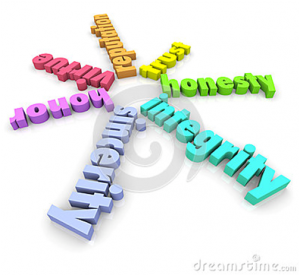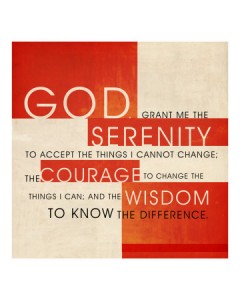Abraham Lincoln, one of my heroes, spoke to a divided nation in 1861 and expressed a hope that everyone, north and south, would be touched by “the better angels of our nature”.

These poetic words are often ringing in my ears when I sit with a divorcing couple hoping that they might be able to summon their best selves during difficult times. Divorce can be so emotionally challenging that it is easy to excuse people who cannot bring their better angels to the process. It would be wrong to judge anyone who, when facing divorce, becomes so blinded by fear or anger that they seem unable to summon their better natures.
Yet, as a
divorce attorney, someone who has a responsibility to help clients achieve better results, I cannot escape the fact that my job requires me to help them, (and if possible their spouse) find their better selves. I do know from nearly three decades of experience that they will make better decisions and get better outcomes, particularly for their children, if they can find their “better angels”.
Until ten years ago, I did not think it was even possible to help clients find their better selves. Hardened by 20 years of practicing
divorce law, I had come to believe that I had to, for the most part, accept irrational and self destructive behavior from my clients. However, during the past ten years, through the Collaborative Process, I have found that there are ways to help people find their better selves and, therefore, achieve better outcomes.
This has been partly due to the training that I have received from my Collaborative Colleagues to help clients in new ways. It is strengthened by the fact that the other attorney will work with my client’s spouse in the same manner; and by the fact that the clients can get the support of a child specialist, financial neutral and coach who will help them both bring their best selves to the table.
 You are getting ready to tell your spouse about your divorce; Should you get an attorney?
On the one hand, you want to be protected. Going through divorce without an attorney can feel like entering a foreign country without a guide. During this difficult process it seems critical to have someone who is truly on your side.
At the same time, you have a fear that lawyers will stir things up and cause unnecessary acrimony and expense. Lawyers can mean court; and your instincts tell you that going to court, or even threatening court, could turn your divorce into an economic and emotional nightmare.
It would be great if you could have the best of both worlds. It would be wonderful if there was a legal expert on your side who will not stir things up; someone who could be your best friend without becoming your spouse’s worst enemy.
Today, in Minnesota, you have that option. It’s called Collaborative Practice. In Collaborative Practice you hire an attorney for settlement purposes only. Collaborative Attorneys are typically trained in ways to help guide you through your divorce that protect your interests without creating unnecessary acrimony. In a Collaborative case, your attorney and your spouse’s attorney are both prohibited from going to court, or even threatening court.
Collaborative attorneys in your community will also meet with you, at no charge, to explain more about the process and to help you learn more about whether Collaborative Practice is the best choice for you. To find a Collaborative attorney and to set up your free consultation, go to www.collaborativelaw.org.
You are getting ready to tell your spouse about your divorce; Should you get an attorney?
On the one hand, you want to be protected. Going through divorce without an attorney can feel like entering a foreign country without a guide. During this difficult process it seems critical to have someone who is truly on your side.
At the same time, you have a fear that lawyers will stir things up and cause unnecessary acrimony and expense. Lawyers can mean court; and your instincts tell you that going to court, or even threatening court, could turn your divorce into an economic and emotional nightmare.
It would be great if you could have the best of both worlds. It would be wonderful if there was a legal expert on your side who will not stir things up; someone who could be your best friend without becoming your spouse’s worst enemy.
Today, in Minnesota, you have that option. It’s called Collaborative Practice. In Collaborative Practice you hire an attorney for settlement purposes only. Collaborative Attorneys are typically trained in ways to help guide you through your divorce that protect your interests without creating unnecessary acrimony. In a Collaborative case, your attorney and your spouse’s attorney are both prohibited from going to court, or even threatening court.
Collaborative attorneys in your community will also meet with you, at no charge, to explain more about the process and to help you learn more about whether Collaborative Practice is the best choice for you. To find a Collaborative attorney and to set up your free consultation, go to www.collaborativelaw.org.  You are getting ready to tell your spouse about your divorce; Should you get an attorney?
On the one hand, you want to be protected. Going through divorce without an attorney can feel like entering a foreign country without a guide. During this difficult process it seems critical to have someone who is truly on your side.
At the same time, you have a fear that lawyers will stir things up and cause unnecessary acrimony and expense. Lawyers can mean court; and your instincts tell you that going to court, or even threatening court, could turn your divorce into an economic and emotional nightmare.
It would be great if you could have the best of both worlds. It would be wonderful if there was a legal expert on your side who will not stir things up; someone who could be your best friend without becoming your spouse’s worst enemy.
Today, in Minnesota, you have that option. It’s called Collaborative Practice. In Collaborative Practice you hire an attorney for settlement purposes only. Collaborative Attorneys are typically trained in ways to help guide you through your divorce that protect your interests without creating unnecessary acrimony. In a Collaborative case, your attorney and your spouse’s attorney are both prohibited from going to court, or even threatening court.
Collaborative attorneys in your community will also meet with you, at no charge, to explain more about the process and to help you learn more about whether Collaborative Practice is the best choice for you. To find a Collaborative attorney and to set up your free consultation, go to www.collaborativelaw.org.
You are getting ready to tell your spouse about your divorce; Should you get an attorney?
On the one hand, you want to be protected. Going through divorce without an attorney can feel like entering a foreign country without a guide. During this difficult process it seems critical to have someone who is truly on your side.
At the same time, you have a fear that lawyers will stir things up and cause unnecessary acrimony and expense. Lawyers can mean court; and your instincts tell you that going to court, or even threatening court, could turn your divorce into an economic and emotional nightmare.
It would be great if you could have the best of both worlds. It would be wonderful if there was a legal expert on your side who will not stir things up; someone who could be your best friend without becoming your spouse’s worst enemy.
Today, in Minnesota, you have that option. It’s called Collaborative Practice. In Collaborative Practice you hire an attorney for settlement purposes only. Collaborative Attorneys are typically trained in ways to help guide you through your divorce that protect your interests without creating unnecessary acrimony. In a Collaborative case, your attorney and your spouse’s attorney are both prohibited from going to court, or even threatening court.
Collaborative attorneys in your community will also meet with you, at no charge, to explain more about the process and to help you learn more about whether Collaborative Practice is the best choice for you. To find a Collaborative attorney and to set up your free consultation, go to www.collaborativelaw.org. 





 These poetic words are often ringing in my ears when I sit with a divorcing couple hoping that they might be able to summon their best selves during difficult times. Divorce can be so emotionally challenging that it is easy to excuse people who cannot bring their better angels to the process. It would be wrong to judge anyone who, when facing divorce, becomes so blinded by fear or anger that they seem unable to summon their better natures.
Yet, as a
These poetic words are often ringing in my ears when I sit with a divorcing couple hoping that they might be able to summon their best selves during difficult times. Divorce can be so emotionally challenging that it is easy to excuse people who cannot bring their better angels to the process. It would be wrong to judge anyone who, when facing divorce, becomes so blinded by fear or anger that they seem unable to summon their better natures.
Yet, as a Many recovering alcoholics claim that the wisdom of The Serenity Prayer saved their life. I have found in my practice that the wisdom contained in this simple prayer can also serve as an essential guide for helping people through a difficult divorce.
The Serenity Prayer, which asks for the serenity to accept the things you cannot change; the power to change the things you can and the wisdom to know the difference, provides an important framework for dealing with almost all difficult situations.
Divorce almost always creates unfortunate realities that lie outside our control; the fact that you will not see your children on certain days; the reality that your family income will now be spread through two homes; and many other stubborn truths. These realities cannot be changed and, in the end, the ability to find acceptance and serenity is a worthy goal.
Divorce also requires people to summon courage to address daunting challenges; finding ways to co-parent when you are angry or scared; learning to manage new financial challenges; or trying to communicate effectively in painful situations. People who find this courage in divorce are much more likely to achieve their goals.
Finally, gaining wisdom about which areas need acceptance and which challenges require us to act courageously is often the ultimate challenge in a divorce. While some of this wisdom may come from
Many recovering alcoholics claim that the wisdom of The Serenity Prayer saved their life. I have found in my practice that the wisdom contained in this simple prayer can also serve as an essential guide for helping people through a difficult divorce.
The Serenity Prayer, which asks for the serenity to accept the things you cannot change; the power to change the things you can and the wisdom to know the difference, provides an important framework for dealing with almost all difficult situations.
Divorce almost always creates unfortunate realities that lie outside our control; the fact that you will not see your children on certain days; the reality that your family income will now be spread through two homes; and many other stubborn truths. These realities cannot be changed and, in the end, the ability to find acceptance and serenity is a worthy goal.
Divorce also requires people to summon courage to address daunting challenges; finding ways to co-parent when you are angry or scared; learning to manage new financial challenges; or trying to communicate effectively in painful situations. People who find this courage in divorce are much more likely to achieve their goals.
Finally, gaining wisdom about which areas need acceptance and which challenges require us to act courageously is often the ultimate challenge in a divorce. While some of this wisdom may come from 